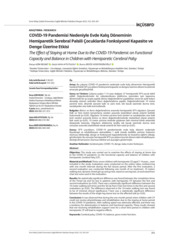COVID-19 Pandemisi Nedeniyle Evde Kalış Döneminin Hemiparetik Serebral Palsili Çocuklarda Fonksiyonel Kapasite ve Denge Üzerine Etkisi
-
Tür
Makale
- Yayın Tarihi 2022
-
Yayıncı
İzmir Kâtip Çelebi Üniversitesi Sağlık Bilimleri Fakültesi
- Dergi Adı İzmir Kâtip Çelebi Üniversitesi Sağlık Bilimleri Fakültesi Dergisi 2, ( 7 ), pp.203 - 207
- Tek Biçim Adres https://hdl.handle.net/11469/2055
-
Konu Başlıkları
Serebral palsi
COVID-19
Denge
Kaba motor fonksiyon
Cerebral palsy
Balance
Gross motor function
Öz
Amaç: Bu çalışma COVID-19 pandemisi nedeniyle evde kalış döneminin Hemiparetik Serebral Palsili (SP) çocukların fonksiyonel kapasite ve dengesi üzerine etkisini incelemek amacıyla gerçekleştirildi.Gereç ve Yöntem: Çalışma yaşları 7-14 arası değişen 37 hemiparetik SP’li çocuk dahil edildi. Değerlendirmeler bir videokonferans platformu üzerinden tam kapanma döneminde bir ay arayla yapıldı. Birinci değerlendirme yapıldıktan sonra bir aylık tedavi almadığı sürenin ardından ikinci değerlendirme yapıldı. Değerlendirmede 10 metre yürüme testi, dinamik zamanlı kalk ve yürü testi, tek bacak üzerinde durma testi, sandalyeden otur kalk testi kullanıldı.Bulgular: Birinci ve ikinci değerlendirme arasında hemiparetik SP’li olguların Zamanlı Kalk ve Yürü testini tamamlama süreleri arasında istatistiksel olarak anlamlı farklılık bulunmadı (p>0,05). Olguların 10 metre yürüme testi süreleri ve sandalyeden otur kalk testi süreleri arasında birinci ve ikinci değerlendirmelerde istatistiksel olarak anlamlı fark vardı (p<0,05). 10 metre yürüme testinde gözlenen fark minimal klinik anlamlılık düzeyinde bulundu. Olguların etkilenmiş tarafta tek bacak üzerinde durma testi sonuçları arasında istatistiksek olarak anlamlı bir fark vardı (p<0,05).Sonuç:SP’li çocukların, COVID-19 pandemisinde evde kalış dönemi nedeniyle fizyoterapi ve rehabilitasyon alamadıkları 1 aylık sürede özellikle yürüme hızlarının olumsuz etkilendiği, denge ve fonksiyonel kapasitelerinde ise bozulma eğilimi olduğu görülmüştür. Bu sonuçlar hemiparetik SP’li çocukların kısa bir dönem dahi rehabilitasyon desteği almamasının olumsuz etkilere yol açacağını göstermiştir.
Anahtar Kelimeler: Serebral palsi, COVID-19, denge, kaba motor fonksiyon.
Abstract
Objective: This study was carried out to examine the effects of staying at home due to the COVID-19 pandemic on the functional capacity and balance of children with hemiparetic Cerebral Palsy (CP).Material and Method: Thirty-seven children with hemiparetic CP, aged 7-14 years, , were included in the study. Evaluations were conducted on the online video conferencing with one month intervals during the full closure period. After the first evaluation, a second evaluation was conducted following one month of no treatment. 10 meters walking test, dynamic timed get up and go test, stand on one leg test, sit and stand from chair test were used in the evaluation.Results: No statistically significant difference was found between the completion times of the Timed Up and Go test in patients with hemiparetic CP between the first and second evaluations (p>0.05). There was a statistically significant difference between the 10-meter walking test times and the Sit-Up from Chair test times in the first and second evaluations (p<0.05). The difference observed in the 10-meter walking test was foundto be of minimal clinical significance. T here was a statistically significant differencebetween the results of the single-leg stance test on the affected side (p<0.05).Conclusion: It was observed that during the one-month period when children with CP could not receive physiotherapy and rehabilitation due to the staying at home period in the COVID-19 pandemic, their walking speed was adversely affected, and there was a tendency for deterioration in balance and functional capacity. These results showed that not receiving rehabilitation support even for a short time period in children with hemiparetic CP will lead to negative effects.
Keywords: Cerebral palsy, COVID-19, balance, gross motor function.
-
Koleksiyonlar
FAKÜLTELER
SAĞLIK BİLİMLERİ FAKÜLTESİ

 Tam Metin
Tam Metin

